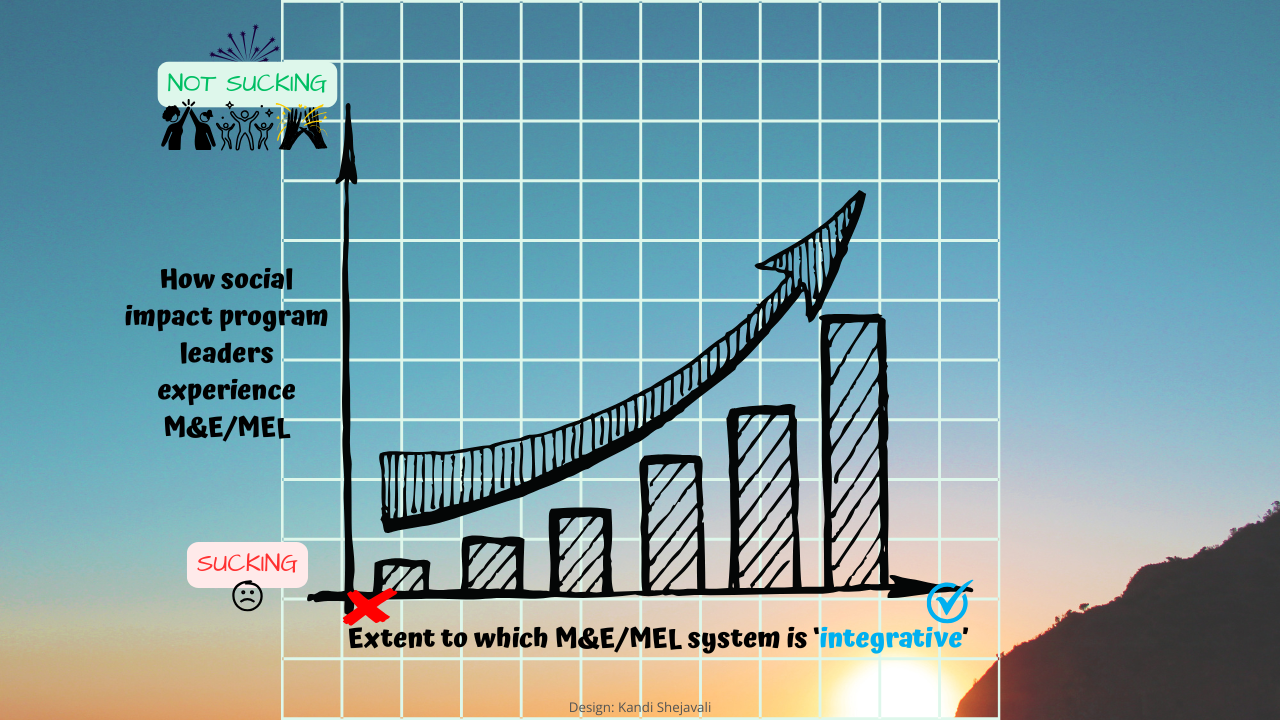Why 𝑌𝑜𝑢 Need the ‘Integrative’ Approach to Program Results Measurement, Learning, and Reporting
Oct 06, 2025
What Results-Oriented Social Impact Program Leaders Understand and Want
If you’re the results-oriented leader of a small-but-mighty social impact organization*, you know that credibly proving and improving your program’s impact is the most logical and effective way to achieve the two foremost strategic objectives for most, if not all, people in your position:
- deepen impact; and
- attract, qualify for, and retain the kind of investment – and not just in the form of funding – that enhances the sustainability of your work and the vitality of your organization.
I see you.
You want to be able to credibly demonstrate and deepen the difference that your program makes so that you can showcase the value of your efforts (which feels especially pressing when your organization approaches a milestone anniversary) – BUT:
- you feel intimidated – or downright turned off – by traditional or conventional program results measurement, learning, and reporting…aka monitoring and evaluation (M&E…or MEL, MERL, MEAL, SI); or
- you don’t know where to begin.
Yet you haven’t given up (or you wouldn’t be reading this).
Thank you for not throwing in the towel.
I wrote an article just for you, to encourage you with a different take on M&E/MEL and to let you know that you don’t have go it alone and that you can see – actually feel – results sooner than you think.
You can check that article out over on the Nonprofit Insights blog here.
(I encourage you to head over to that article and read it first before you read this article further. Go on, I’ll be patiently waiting for you here.)
My Pause While You Head Over to Read That Article
(What are you doing reading this, you should be over at the other article.)
Now That You’re Back, Let’s Talk About What This is All Really About – You
In this article, I want to let you in on something that I probably haven’t stated explicitly enough.
All of this is really about you.
- By “all of this”, I mean everything related to robustly demonstrating and deepening the results of your program(s).
- By “you”, I’m talking about, well, you – and I’m especially talking about your wellbeing and peace of mind.
Now I know that focusing on yourself might not be something you’re comfortable with.
You give your all to make the piece of the planet you work in a better place – demonstrably. Thanks to your efforts, wellbeing is being spread to more people. And that makes the world, as a whole, a better place. For that, I’m deeply grateful. Thank you – and if you want more big ups from me, see the praises I sing to you and people like you here and here.
But when’s the last time you put yourself front and center in the work you do, specifically your wellbeing and peace of mind?
Are You Working Sustainably?
You’re probably no stranger to the burnout crisis that we’re all hearing about in the social impact sector.
I won’t go into the details here, you likely know them better and more personally than I ever will. (And in case you don’t or you want to learn more, just type “Tell me about burnout in the social impact sector” into Perplexity AI and you’ll read about how widespread and urgent of an issue it is and its negative consequences on individual wellbeing and organizational effectiveness.)
What I do want to delve into, though, is whether you’ve considered if your work is sustainable. And I don’t mean the sustainability we talk about in program effectiveness terms. I’m talking about sustainable for you.
Can you go at your current pace, keeping on doing the things you currently do, the way you do them, and not burn out?
Don’t answer right away, even if you know that the answer is “no”.
Really reflect on that for a moment.
Can you keep this up?
Are you thriving as you help others thrive?
Or, if you just can’t take putting yourself front and center for a change, let’s put in this way: Can the people you serve truly thrive if you’re not thriving? (One of the mindset shifts I teach members of my Results Measurement Mastery (RMM) program is that if they’re not thriving, their organizations can’t thrive, and the people they’re aiming to support can’t thrive either.)
The Integrative Approach to Results Measurement Is About Ensuring That You Thrive, Too
If you’ve reached the conclusion that you need to do things differently, in a way that does a better job of preserving your wellbeing and peace of mind, know that the integrative approach to M&E/MEL has that at its heart.
That’s why it’s oriented towards helping you achieve your strategic objectives.
That’s why it’s set up not to be an add-on, but to be an integral part of your ‘business’. It provides the robust structure every social impact program leader needs to have greater intentionality in their work – and not just when it comes to measuring results – and, ultimately, aims at contributing to a healthier organizational environment…and a healthier you!
One of the over 50 social impact program leaders I spoke with during my 11-month research project in 2024-2025 said that if she could get M&E/MEL right, it would enable her to at last go on vacation. (Talk about recognizing the power of M&E/MEL! 😊)
Well, I want you to be able to go on vacation – or to do whatever it is that you’ve been depriving yourself of as you work your heart out to make others’ lives better.
Because what’s the point of helping others thrive if you’re not thriving along the way, too?
What’s the point in trying to make a sustainable difference if you’re not sustaining yourself?
So do everyone a favor and make sure you’re taking care of yourself, okay?
And when you’re ready to thrive with proven support that meets you where you are and equips you to go further – sustainably –, get your slot on my calendar and let’s connect to explore if you’re a right fit for the RMM program.
Note for the asterisk:
*That’s you, founder and executive director of a small nonprofit. That’s also you if you lead a foundation, social enterprise, or corporate social responsibility (CSR) program.
Suggestion for how to cite this article (using APA 7 style):
Shejavali, K. (2025, October 6). Why You Need the ‘Integrative’ Approach to Program Results Measurement, Learning, and Reporting. Blog article. RM3 Consulting. Available at: https://rm3resources.com/blog/why-you-need-integrative-results-measurement (accessed: [insert the date that you last accessed the article]).




